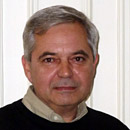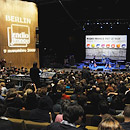Project Description
Prize Winners 2010
Television Prize
Frédéric Compain / Bruno Lancesseur
« EADS-Airbus, eine Staatsaffäre »
France 3 / ARTE

Frédéric Compain

Bruno Lancesseur
The Television Prize is awarded to the authors Frédéric Compain and Bruno Lancesseur for their film “EADS Airbus, an Affair of State”. The 90-minute documentary was shown by ARTE in coproduction with France 3.
The film throws light on the backgrounds of the latest scandal around insider trading by shareholders and top managers. The jury commends the intensive two-year research effort put into creating this investigative feature about the European aerospace corporation. The film additionally captivates with many unusual visual ideas and its outstanding composition.
Radio Prize
Jean-Luc Hees / Dr. Willi Steul
Radio France / Deutschlandradio

Radio France fait le mur (photo: Christophe Abramowitz)
The Radio Prize is awarded to Jean-Luc Hees and Dr. Willi Steul – as representatives of all those involved – for the “Radio France does the Wall” theme day in cooperation with Deutschlandradio.
The jury regards this as an outstanding contribution to the Franco-German dialogue. The 24-hour live broadcast from Berlin on 9 November 2009 commemorates an event that changed world history in various ways, including interviews, reports, testimonies from contemporary witnesses and a concert broadcast. It simultaneously builds a bridge to the present. The unique hook-up of all Radio France programmes enabled the significance of this anniversary to be brought home to millions of listeners.
More than a hundred Radio France staff were in Berlin for this occasion, where they were energetically supported by their German colleagues. This type of cooperation serves the aim of the FGJP, “to encourage German and French media creatives to cooperate”, in an exemplary manner.

Johannes Kloth
In the Print Media category, the prize goes to Johannes Kloth for his article “Bon appétit”, published by Saarbrücker Zeitung. The author writes about an a priori worn subject that is one of the German stereotypes of the average French – frog’s legs.
But in doing so, says the jury, it refuses to cater to these clichés, delivering a thoroughly researched story instead that reflects economic aspects along with culinary and cultural ones. Thanks to its interviews and original, apt scenes, it succeeds in toppling stubborn intercultural preconceptions.
Internet Prize – donated by the Département de la Moselle
Anne Mailliet / Brice Boussouar
„Webdoc – La chute du mur de Berlin“
France 24

Anne Mailliet

Brice Boussouar
The Internet Prize donated by the Département de la Moselle is awarded to Anne Mailliet and Brice Boussouar for the web presentation “Webdoc – The Fall of the Berlin Wall” (on the pages of www.france24.com, in cooperation with Jérôme Pidoux). The jury was impressed by the multimedia portrayal of last year’s dominant historical theme, the 20th anniversary of the Wall coming down in Germany.
Thanks to an intelligently conceived presentation that is easy to explore, the internet dossier offers a treatment that caters to the target group and, besides entertaining elements, does not neglect journalistically informative ones. The jury furthermore showed itself convinced by the professional quality of the pictures, videos and the selection of contemporary witnesses.
Young Talent Prize donated by the Franco-German Youth Office
Julia Friedrichs / Eva Müller
WDR

Julia Friedrichs and Eva Müller
The Young Talent Prize donated by the Franco-German Youth Office is awarded to Julia Friedrichs and Eva Müller for their television report “Paris rather than Benefits” from the series “WDR Worldwide”. The authors tell the story of a German family that is on benefits, but then emigrates to France as “guest workers”, full of surprises from the beginning to the end.
This is a long-term observation of three years’ duration (!) that exemplarily succeeds to show in 28 minutes how the family’s attitude to French society changes and how their integration slowly succeeds after great initial difficulties. The film fascinates because the narrative stance follows the contradictory trajectories of the family’s individual members. The film is touching, comes very close to its protagonists, but is never voyeuristic.

